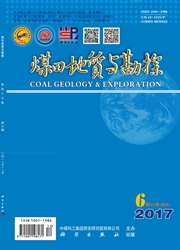

 中文摘要:
中文摘要:
为了深入认识木里煤田煤系沉积环境及聚煤规律,在已有研究成果的基础上通过野外踏勘 及钻井等资料分析,对木里煤田西部地区聚煤期早-中侏罗世含煤岩系进行了层序古地理特征及聚 煤作用分析.结果表明:木里煤田西部地区中-下侏罗统可划分为4个3级层序;中侏罗世早- 中期(即层序2-层序3沉积期)是整个木里煤田西部的主要聚煤期,沉积相多以辫状河三角洲平原、 三角洲前缘和浅湖相为主,物源主要来自于NE 向;其中以中侏罗世早期的聚煤环境最好,形成 了聚乎更聚煤中心;中侏罗世中期成煤环境相对变差,煤层厚度变薄层数增多,聚煤中心西移至 雪霍立、哆嗦公玛.沉积相及古地理特征对聚煤作用具有显著的影响和控制,这一认识对木里煤 田西部煤及煤系矿产勘查开发具有重要指导意义.
 英文摘要:
英文摘要:
In order to reveal the coal series sedimentary environment and coal accumulation regularity of Muri coalfield, based on the existing research and the analysis of field reconnaissance and drilling data, this study mainly focuses on the sequence-paleogeography and the coal accumulation analysis of the Early-Middle Jurassic sedimen-tary strata in the major coal accumulating period of the western part of Muri coalfield. The results showed that Mid-Lower Jurassic strata can be divided into four third order sequences. The early-mid Middle Jurassic(the depo-sition period of sequence 2-3) was the major coal accumulating period in the western part of Muri coalfield, when the strata was deposited in braided river delta plain, delta front and shallow lake, and provenance direction mainly comes from NE. The coal accumulating environment in the early Middle Jurassic is the best of coal-accumulating period, forming the coal accumulating center in Juhugeng. But in the mid Middle Jurassic, the coal accumulating environment was relatively poor, so the coal seams become thin and numerous, and the coal accumulating center moved westward to Xuehuoli and Duosuogongma. All the results showed that the sedimentary facies and paleo- geography characteristics have remarkable influence and control on coal-accumulating process. The above under-standing provided important guidance to coal exploration and development in the western part of Muri coalfield.
 同期刊论文项目
同期刊论文项目
 同项目期刊论文
同项目期刊论文
 期刊信息
期刊信息
